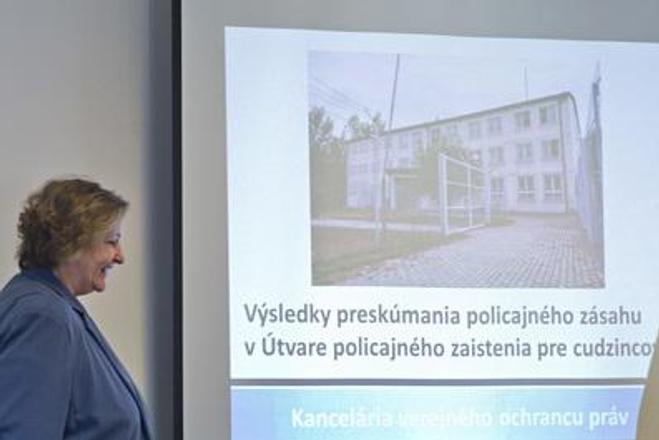This stems from a report by Ombudswoman Jana Dubovcová who sent an inspectorate to Medveďov refugee camp, where in early September 45 people stopped accepting food and refused to leave the canteen demanding to be deported back to Hungary. They learned that migrants from Hungary were then allowed to travel to Germany and they wanted to go as well. Police detained and searched them using violence which some refugees complained about.
“Slovak police still have not learned how to use force in a proper way,” Dubovcová told the press.
The course of the intervention is still being investigated by the Interior Ministry’s Internal Affairs Inspectorate. Contrary to the ombudswoman's claims, the Police Presidium says that police officers were as mild as possible using explanations and verbal persuasion when dealing with rioting refugees.
“The action was professional which is proven even by the fact that no one was seriously wounded,” Police press department told the press.

Freedom and deport
The capacity of the Medveďov camp is 152 people, and most of its current residents are from Syria and Afghanistan. They are waiting there for deportation back to their own countries. On the morning of September 3 refugees sitting in the canteen refused to accept breakfast, started cheering words like “freedom” and “deport” and did not want to leave. Soon another 50 refugees who were in their rooms joined them in shouting.
Refugee camp management told Dubovcová’s inspecting officials that it did not know how the situation would evolve therefore it called for assistance and altogether 68 police officers were prepared to take action, according to the ombudswoman.
Police initiated the intervention at 11:45 after police officers repeatedly attempted to verbally restore order in the facility. The video provided by police shows that officers entered the room with an interpreter who was one of the refugees and was obviously nervous. He shouted “put your hands on stôl” meaning ‘put your hands on the table’.
“On Thursday we refused to eat and demanded deportation and they called special commandos on us,” one of the refugees told the ombudswoman’s employees. “Then they took us out in fives [persons]. And we asked why and they did not answer and laughed at us.”
Refugees in fact obeyed police orders, did not resist handcuffing and left the room in groups of five following security rules, the video shows.
Beating in rooms
Police officers searched the refugees finding various secured handmade stabbing and cutting weapons from the most aggressive of the migrants. This was the reason why camp management ordered the search of a second group of migrants shouting in their rooms, noted the Police Corps press department.
Police published the video of the action which took place in a hall with rooms showing that refugees were acting peacefully and obeyed police orders even when they were given in Slovak. Initially they had to leave the rooms and stand close to the walls with their hands behind their backs. Soon police officers ordered them to lay on the ground. Subsequently, they took refugees to their rooms where they were searched and cuffed.
“Members of the commando unit moved to all rooms and started to beat us with hands, legs and batons,” refugees told Dubovcová’s employees. “Some of them jumped on us with no mercy.”
The ombusdwoman said that such action cannot be adequate.
When approached by The Slovak Spectator the police refused to describe the process of detaining and searching refugees because it is still awaiting the results of the ministry’s inspection.
Resembling prison
It is not hard to get frustrated in Medveďov refugee camp. As it is constructed to keep refugees locked there, its rules resemble those in prison. Inmates can go outside the building only twice per day for one hour where they are also locked in and they are constantly watched, according to Human Rights League’s lawyer Barbora Meššová.
“We demanded that at least families with children should be allowed to get out more often,” Meššová told The Slovak Spectator. “Sadly, we were refused because the facility doesn’t have enough employees who would accompany them.”
Moreover, there is a special place for misbehaved people or those who are sick and have to be kept away from others. Its function is not primarily focused on punishment, yet it resembles rather a cell for problematic prisoners than an isolation room for quarantine, according to Dubovcová’s office.
There is a camera recording the whole room including toilet facilities, therefore an inmate has no privacy there. Moreover, rooms are furnished only with a bed and table, thus the person living there has minimum opportunity for activities. There are bars instead of doors therefore lights which are constantly on do not allow for sleeping in complete dark.
Lack of interpreters
Another shortcoming of detention facilities for refugees is a lack of interpreters criticised by both the Ombudswoman and NGOs. Most of their employees, police officers and medics speak poor English and they do not have agreements with people who speak Arabic or Persian to come when they are needed.
The alien police which deals with refugees utilises interpreters usually during the asylum process or other legislative activities related to migrants. However, they are missed in every day life when they could deal with common problems of refugees, according to Meššová.
“For example, when someone is sick they don’t have a chance to speak about that with medics whose English is often very poor,” Meššová said.
The Police Presidium refused to say whether it will hire more interpreters for refugee camps or not.
Such people could be important however; for example, they could be also used as mediators and peace-makers, according to Dubovcová.
“I am sure that if refugees were informed about what is happening in an understandable way, the whole thing would not have happened,” Dubovcová said.



 Ombudswoman Jana Dubovcová (source: TASR)
Ombudswoman Jana Dubovcová (source: TASR)